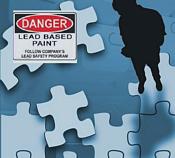Lead Poisoning Is Growing In Belmont MA
On Sunday April 24, 2011 I read an article in the Boston Sunday Globe by Erica Noonan titled Back to the Garden. The article was about the Victory Gardens in Belmont MA. Noonan did a great job describing the history of gardens, who uses them, how people decorate them and what people are growing in them ranging from flowers to food. What caught my eye was a picture of an old wooden window sash used to decorate one of the gardens. I instantly suspected the sash could contain lead paint and if so, could cause serious health concerns. On Monday afternoon I stopped by the Gardens to check it out. The video below tells the story.
As you can see from the video gardeners are definitely bringing lead paint into the gardens. As the paint breaks down due to age and exposure to the elements the lead dust and chips are falling and/or are being washed by the rain onto the ground contaminating the soil being used by the gardeners. In addition to window sashes I also found and tested several gates, boards and doors that also contained lead paint.
I suggest gardeners everywhere need to be aware of the risks they take on when using old painted materials in their gardens. Of course it is best to not bring items containing lead or lead paint into your garden, but unfortunately someone else may have already done so in the past. Also, if you plant a garden next to the walls of an older home, it is best to assume the soil is contaminated with lead. Years of peeling, scraping, sanding and repainting of the siding on a home can drop lead chips and dust onto the soils around your home. Without testing you will never know if the soil has been contaminated.
 On a web site by the name of BelmontPatch.com one of the gardeners, Marilyn Decource, commented about the gardens:
On a web site by the name of BelmontPatch.com one of the gardeners, Marilyn Decource, commented about the gardens:
It's wonderful, she said, to have the community garden plot so close to her home where she can come a few hours to tend her plants every other day. "It's good to be able to eat something organic. You really can't get vegetables this good at a grocery store." Perhaps part of her success in the plot is that she doesn't use pesticides or fertilizer but does sprinkle a layer of compost over the entire garden, Decourcey said. This year, she added a layer of manure to the soil.
Marilyn might want to do a little research about gardening in lead contaminated soils before assuming her vegetables are safe to eat. Click here to learn about the signs of lead poisoning.
To be safe, gardeners should do their own research if they suspect their garden may contain lead. Here is some information I found at the Cornell University website about gardening in lead contaminated soils:
When gardening in lead contaminated soils, safety measures should be taken.
- Wear gloves, or wash hands thoroughly after gardening and especially before eating, and be sure small children do not eat garden soil. Gardeners can bring lead-contaminated soil into the house on shoes and clothes, increasing levels of lead soil and dust in the home. This is especially a concern for crawling toddlers and infants. Remember that children tend to be at a greater risk of lead exposure from soils when the soil is directly taken into the body.
- Plants may absorb some of the lead present in soil through their roots. Any lead that is absorbed tends to concentrate in leaves and the outer part of roots, so peel root crops such as beets, carrots, turnips, and radishes before eating.
- Grow vegetables that produce edible fruits such as tomato, peppers, cucumber, squash, etc. Lead absorption into plants does not concentrate in the fruits.
- If your soil has a lead contamination problem, grow fewer edible fruits and vegetables and more flowers, trees and shrubs.
 Like construction workers who are exposed to lead in the course of their work, Gardeners should also consider that their skin and their clothes may become contaminated. Always wash your hands immediately after gardening and definitely before eating, drinking or smoking to avoid ingesting lead dust. To reduce the risk of bringing lead contaminated soil into the home, rinse and launder gardening clothing promptly. Being educated about the dangers of lead and ways to protect yourself as well as your family can help make sure you’re not growing a lead problem in your garden.
Like construction workers who are exposed to lead in the course of their work, Gardeners should also consider that their skin and their clothes may become contaminated. Always wash your hands immediately after gardening and definitely before eating, drinking or smoking to avoid ingesting lead dust. To reduce the risk of bringing lead contaminated soil into the home, rinse and launder gardening clothing promptly. Being educated about the dangers of lead and ways to protect yourself as well as your family can help make sure you’re not growing a lead problem in your garden.
If you would like more information about the Belmont Victory Gardens click here, or contact Conservation Commission Agent Mary Trudeau in the Office of Community Development at 617-993-2667 or mtrudeau@belmont-ma.gov

 Looking for accurate information about the EPA RRP rule?
Looking for accurate information about the EPA RRP rule? 


